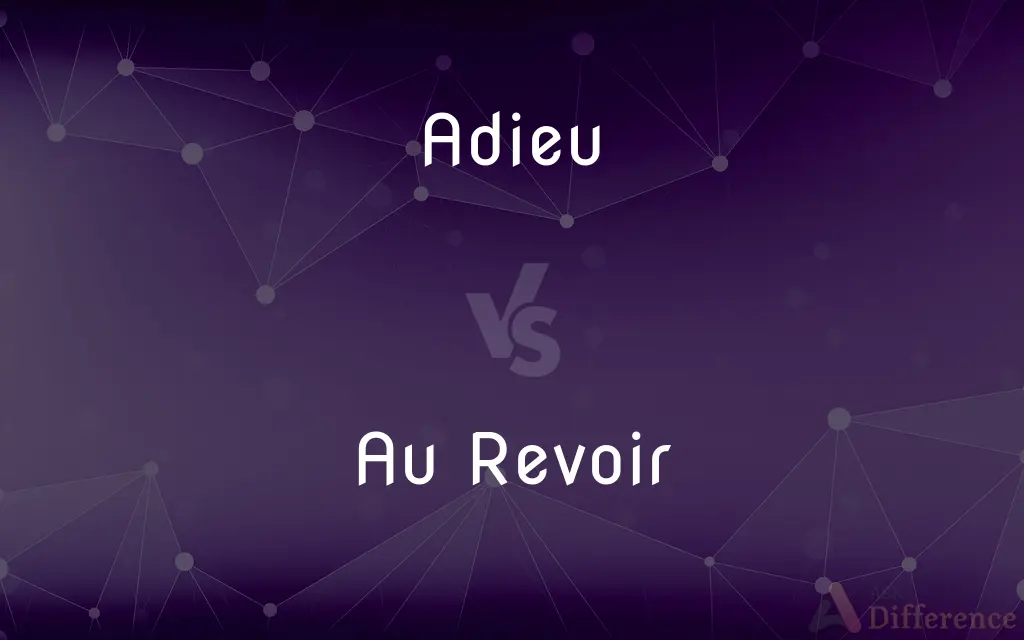Adieu vs. Au Revoir — What's the Difference?
By Tayyaba Rehman — Published on January 31, 2024
"Adieu" is a French farewell implying a permanent goodbye, while "Au revoir" means "until we meet again," suggesting a temporary departure.

Difference Between Adieu and Au Revoir
Table of Contents
ADVERTISEMENT
Key Differences
"Adieu," derived from French, conveys a sense of finality, often used when parting for a long time or forever. "Au revoir," also French, implies a temporary farewell, anticipating future meetings.
"Adieu" carries a more emotional, sometimes solemn tone, suggesting a lasting goodbye. In contrast, "Au revoir" is more casual and optimistic, used in everyday departures.
While "adieu" is often reserved for more serious or permanent farewells, "au revoir" is commonly used in casual, everyday situations in French-speaking areas.
"Adieu" can be seen in literature and film to emphasize dramatic goodbyes. "Au revoir," however, is part of regular conversational French, reflecting the routine of parting and meeting again.
Historically, "adieu" was used in more formal or final farewells, and its use has become less common in modern language. "Au revoir" maintains its popularity in contemporary French as a standard form of saying goodbye.
ADVERTISEMENT
Comparison Chart
Meaning
Goodbye forever
Goodbye until we meet again
Connotation
Final, sometimes solemn
Casual, optimistic
Frequency of Use
Less common, more formal
Common in everyday language
Emotional Weight
Heavier, more emotional
Lighter, routine
Cultural Context
Used in serious, permanent goodbyes
Used in regular, temporary departures
Compare with Definitions
Adieu
Farewell with a sense of finality.
She whispered adieu, knowing they might never meet again.
Au Revoir
Casual and routine in nature.
After the meeting, they all exchanged au revoirs.
Adieu
Less common in casual conversation.
The movie ended with a dramatic adieu.
Au Revoir
Used in everyday French language.
Au revoir, see you tomorrow!
Adieu
Often used in serious or permanent goodbyes.
At the end of the letter, he wrote a heartfelt adieu.
Au Revoir
Implies an expectation to meet again.
He waved and cheerfully said au revoir.
Adieu
Carries emotional and solemn undertones.
Their adieu was filled with unspoken emotions.
Au Revoir
Lighter in emotional weight than adieu.
With a quick au revoir, she left for her class.
Adieu
Used to express farewell.
Au Revoir
A temporary goodbye.
She said au revoir to her friends at the airport.
Adieu
A farewell.
Adieu
Said to wish a final farewell; goodbye.
Adieu
A farewell, a goodbye; especially a fond farewell, or a lasting or permanent farewell.
We bid our final adieus to our family, then boarded the ship, bound for America.
Adieu
Good-by; farewell; an expression of kind wishes at parting.
Adieu
A farewell; commendation to the care of God at parting.
Adieu
A farewell remark;
They said their good-byes
Adieu
Sometimes found in formal or literary contexts.
The novel's protagonist bid adieu to his homeland.
Common Curiosities
What does adieu mean?
It means a farewell with a sense of finality.
What does au revoir mean?
A temporary goodbye, implying future meetings.
In what context is adieu used?
In serious or permanent farewells.
Does adieu imply a reunion?
No, it usually suggests a permanent goodbye.
Is adieu a common term in French?
Less common, used in formal or emotional goodbyes.
Can au revoir be used in formal settings?
It's more casual, but can be used politely in formal situations.
Is au revoir optimistic?
Yes, it carries an optimistic tone of meeting again.
How is au revoir used in conversation?
Commonly in casual, everyday goodbyes.
How does adieu differ in emotional weight?
It's heavier and more emotional than au revoir.
Can "Au Revoir" be used in everyday conversation?
Yes, "Au Revoir" can be used in everyday conversation when you want to convey a sense of departing with the intention of seeing someone again.
Are both "Adieu" and "Au Revoir" used in formal settings?
Yes, both can be used in formal settings, depending on the level of formality and the emotional tone you want to convey.
In which culture are these phrases more commonly used?
Both phrases are of French origin but can be found in various cultures and languages, with "Adieu" being less common in English.
Is "Au Revoir" more formal than "Goodbye"?
It is somewhat more formal than "Goodbye," but it's still commonly used in casual and polite conversations.
Which one should I use when saying goodbye to someone I'll see again soon?
You should use "Au Revoir" in this case, as it implies a temporary parting with the intention of reuniting.
Share Your Discovery

Previous Comparison
Tetrahedral vs. Trigonal Pyramid
Next Comparison
BDrip vs. BRripAuthor Spotlight
Written by
Tayyaba RehmanTayyaba Rehman is a distinguished writer, currently serving as a primary contributor to askdifference.com. As a researcher in semantics and etymology, Tayyaba's passion for the complexity of languages and their distinctions has found a perfect home on the platform. Tayyaba delves into the intricacies of language, distinguishing between commonly confused words and phrases, thereby providing clarity for readers worldwide.













































